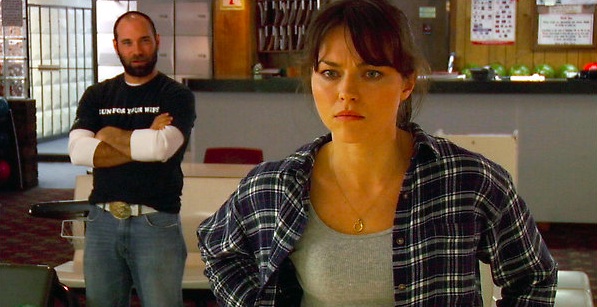
Sunny (Trieste Kelly Dunn) is an active thinker. When her eyes aren’t buried in a novel they’re silently observing other people’s lives in motion. The calm opening moments of Brett Haley’s sublime character study The New Year proves as much. As Sunny goes about her daily tasks working at a local bowling “center” in Pensacola, Florida, she scans the hazy space with the inquisitive yet restless eye of a detective lacking a case. But this is simply a facade masking the type of internal melancholy that could only stem from a vibrant young woman snake-bitten by inaction. Once a star high school student and budding writer, Sunny is now seeped in a prolonged, self-induced purgatory initiated by her father’s devastating illness and an absent matriarch who’s flown the coop. At this point in her existence, life is simpler and safer in theory.
But things have to change. The New Year follows a prolonged moment in Sunny’s life when the trauma of the past and the pressure of the future collide and force such a transition. Haley’s debut surrounds her malaise with acts of kindness and wake-up calls, yet it avoids melodrama in favor of honest reflection. Sunny makes a lot of mistakes during the film, whether it’s ignoring the signs of her father’s deteriorating condition or flirting with an old nemesis despite being in a long-term relationship with a good guy. Instead of judging, Haley’s camera watches Sunny intently, examining the nuances of her struggle and placing them together as pieces of a grander puzzle that has yet to be completed. This is a woman not quite in focus, but one that is worth waiting for.
Throughout The New Year, Haley positions Sunny at the center of nearly every frame. In doing so, the viewer begins to notice patterns of denial within a character struggling to hide multiple repressed emotions. Facial expressions are paramount to Dunn’s astutely subtle performance; the actress speaks volumes with one crooked smile or guilt-ridden glance. Exposing emotions like joy, guilt and regret without words is a talent few actors can claim, yet Dunn manages to do so with effortless precision. Since The New Year is basically a collection of small moments, it gains resonance as scenes build on top of each other. Ultimately, this creates a sly sense of momentum that culminates in one of the most stunningly subtle finales in recent American cinema.
It’s late New Year’s Eve and Sunny leaves a particularly awkward party, one in which both of her love interests are attending, to visit her father in the hospital. Initially, this might seem like an anticlimax, another example of a confused character avoiding the inevitable consequences of her own bad decision making. But this couldn’t be farther from the truth. By removing herself from a toxic situation, admittedly one she helped create, Sunny embraces the beginning of her own rebirth.
Watch a scene from ‘The New Year’
It’s not an easy first step. One cut later, she enters the hospital room quietly, her father lying asleep on the bed. The writing is one the wall along with the Christmas decorations placed there by Sunny’s best friend a few sequences before. The television plays footage from Times Square, but the reporting quickly fades. Sunny pulls up a chair, sits down, and reaches for her father’s hand, placing it against her cheek. Tears quietly trickle down her face. Sunny gracefully puts her other hand on his shoulder, pulling herself closer to the man who has defined her life thus far in so many different ways. It’s as if she is finally coming to terms with his fragility, and in turn, her own impending aloneness. Sunny sits up, lowers her father’s hand, and finally brings out a spiral notebook. She begins to write. Those first written words are a declaration of independence, an act she’s been avoiding for the duration of the film. The reporter’s voice once again fills the space, counting down toward a new year and a new beginning. Right before the clock reaches zero, Haley cuts to black.
The entire scene evokes the emotion of a deeply intimate passage from a great novel, something most films would glamorize with over-the-top acting or swooning music cues. But Haley lets Dunn be so naturally Sunny; resilient, loving and ever hopeful. If there’s one transcendent theme in The New Year, it’s that most of our lives are reliant on the generosity of support systems. Those of us that are lucky enough find that when one falters, another takes its place. This film somehow manages to capture such a transition with striking clarity, asking its young characters to let go of the delusion and embrace the beautiful ambiguity of adulthood.



